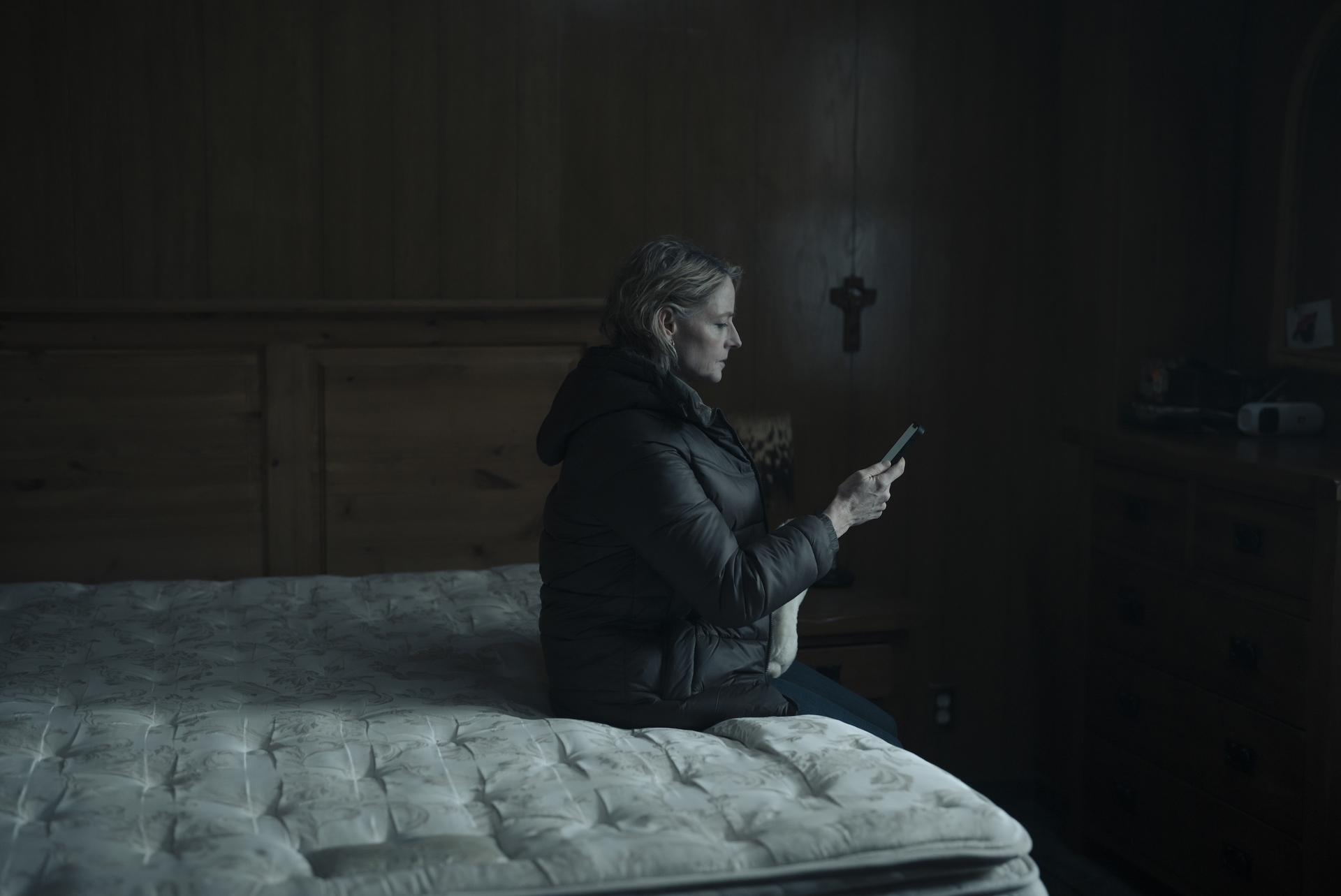Warning: This post contains spoilers for the finale of True Detective: Night Country.
By the end of True Detective: Night Country, the season's biggest mysteries have mostly been solved. But the show takes a whole lot of twists, turns, and (somewhat ambiguous) reveals to get to that point.
After a harrowing penultimate episode that saw Danvers (Jodie Foster), Navarro (Kali Reis), and Prior (Finn Bennett) back themselves into a do-or-die corner for getting to the bottom of the interconnected Annie K (Nivi Pederson) and Tsalal cases, the finale delivers what Bennett has described as an emotional punch.
"[To make a really good detective show,] you need to be satisfied by the ending," he told the Hollywood Reporter. "Sometimes, endings can feel lazy, and this really didn’t feel that way. It stays true to the piece. I remember watching the finale for the first time and bursting into tears, because I was so proud of what we created, but also because the ending is just so beautiful."
Read more: True Detective: Night Country Episode 5 Ends With Many Questions for the Finale to Answer
What happens in the True Detective: Night Country finale?
After discovering that missing scientist Raymond Clark (Owen McDonnell) has been hiding out in a secret underground ice cave lab that connects to the Tsalal research center, Danvers and Navarro realize the lab was where Annie K was murdered. They then force Clark to spill all his secrets.
While dating Clark, Annie K had learned that Tsalal was not only falsifying toxicity numbers for Silver Sky but paying the mine to produce even more waste because the pollution softened the arctic permafrost to the point where the researchers could successfully extract a scientifically groundbreaking microorganism from the ice. Horrified by what they had done, Annie snuck into the lab and destroyed years of their work before she was attacked and stabbed over 30 times by the other scientists as Clark watched. Despite saying he would never hurt her, Clark was ultimately the one to finish the job by smothering Annie. However, he claims it was the cop sent by the mine to move her body—i.e., Hank (John Hawkes)—who cut out her tongue.

Clark goes on to say that Annie returned from the dead to kill the other scientists. But after he escapes outside to commit suicide in the storm, Danvers and Navarro eventually think to inspect the hatch to the underground lab for clues as to what may have happened the night the Tsalal men disappeared. There, they find a handprint missing the top halves of its last two fingers—just like the hand of Blair Hartman (Kathryn Wilder), the local woman working at the Blue King crab processing plant whom we met in episode 1 when Navarro showed up to investigate a confrontation between, Blair, her abusive ex, and Blair's coworker Bee (Diane E. Benson). Both Blair and Bee have since popped up several times throughout the season.
Danvers and Navarro head to Bee's home, where Blair is staying, and Bee tells them her story. In flashback scenes, we see that while working as a cleaner at the Tsalal facilities, Bee discovered that the scientists were the ones who murdered Annie K. She, Blair, and a group of other local Indigenous women then broke into Tsalal with guns, rounded the men up, and turned them loose into the arctic wilderness naked. When Navarro asks if they were the ones who killed the men, Bee responds that, "They did it to themselves. When they dug in her home in the ice. When they killed her daughter in there...If she wanted them, she would take them. And if not, their clothes were there for them. They'd be half-frozen, but they'd survive. But they didn't, though. I guess she wanted to take them."
Given a number of hints that have cropped up throughout the season, the elusive "she" in question seems to be a reference to Sedna, the Inuit goddess of the sea (the same mythical figure that Prior's son Darwin drew a picture of in episode 1). There are various iterations of the Sedna legend, but the story generally goes that Sedna was drowned in the ocean by her father, who cut off her fingers to keep her from climbing back into his boat. She then returned as a goddess seeking revenge on those who wronged her and who upset the balance of the natural world.
"There’s a read of the events in the series, same as with the original True Detective, by the way, that absolutely sticks to reality," showrunner Issa López said during a roundtable interview ahead of the season premiere. "There’s a real explanation for every single event in the series that does not require the presence of the supernatural. But there’s a read where every event is related to what I call a wider world, and it’s up to you, like an inkblot test, to decide which series you’re watching."
Danvers and Navarro take Bee's story in stride, making it clear that they're going to support the explanation that a slab avalanche killed the Tsalal men rather than turn the women in. Their reaction is in line with what we've learned about the pair—that Navarro "has a thing" about violence against women and Danvers, though sometimes more reluctant to show it, shares the sentiment.
What about all the references to True Detective Season 1?
From the crooked spiral to Tuttle United to Danvers' mantra about about not asking the right questions, Night Country has offered plenty of callbacks to detectives Rust Cohle (Matthew McConaughey) and Marty Hart's (Woody Harrelson) hunt for the Yellow King killer in True Detective Season 1. But when Raymond Clark utters the line, "Time is a flat circle," in the Night Country finale, it takes the connection between the two stories to a new level.

Anyone who watched Season 1 will recognize "Time is a flat circle" as Rust's catchphrase. First said to Rust by occultist meth cook Reggie Ledoux moments before Marty shoots him dead, Rust adopts the maxim as his worldview—later deploying it while being interviewed about the Yellow King case nearly 20 years later. The phrase is a reference to a concept popularized by 19th-century German philosopher Friedrich Nietzsche known as "eternal recurrence," the theory that because time is endless, you are destined (or doomed, if you're of a similar mind to Rust) to repeat your life an infinite number of times in exactly the same way you're living it now.
In Night Country, Clark relates the idea that time is a flat circle to Annie taking vengeance on the Tsalal scientists: "She's been hiding in those caves forever—before she was born, after we all die."
But in the end, Night Country, even more so than Season 1, seems to reject this philosophy.
What does the ending of True Detective: Night Country mean?
During their night at Tsalal, Navarro and Danvers are plagued by signs from what we'll refer to as the beyond (the mysterious realm of the dead that has played a significant role in Night Country). In fact—in addition to the eerie appearances of phantom oranges and broken glass—both appear to be literally haunted by the ghosts of their past (Danvers by her son Holden and Navarro by her mom and sister).
With Danvers representing "the non-believer that in moments of doubt believes, and [Navarro] the believer that in moments of doubt doubts," according to López, the tension between the two over their differing outlooks on death has mounted throughout the season. "There's something out there calling me," Navarro tells a frustrated Danvers at one point in the finale. "You need to know something. There's more than this, Liz. There's so much more than just this."
And just as the once unrepentantly nihilistic Rust did in Season 1, Danvers ultimately seems to have a change of heart. After Navarro rescues Danvers from under the ice, Navarro tells her that when Holden appeared in one of her visions, he told her that he "sees" Danvers. This is a direct reference to the peek-a-boo-esque game that Danvers and Holden have repeatedly been shown playing in flashback sequences, but also connects to the blind-in-one-eye symbolism that has recurred throughout the season (think of both the stuffed and living one-eyed polar bear, etc.) On HBO's official Night Country podcast, López said the game is "a little bit of a metaphor" and "a reference to the fact that we see only part of what is around [us]."

When the Season 1 finale aired in 2014, TIME's then TV critic James Poniewozik argued that the show's most shocking development was Rust's shift in perspective after sensing the presence of his late daughter during his near-death experience. "There was a twist ending, though, and it had nothing to do with the plot but rather the psyche, or dare I say the soul, of bleak-hearted Rust Cohle," Poniewozik wrote. "He sees meaning. There’s a story here, one story—the oldest—about the fight between light and dark. He and Marty were given their one bit of the dark to extinguish but, just as with the men in the masks, they’ll never get it all. But, he says, 'Once there was only dark. If you ask me, light’s winning.'"
Considering this closing note, it's apt that the final scenes of Night Country take place months after polar night has ended, on the first long day of the year. As Danvers is interviewed about the events that took place surrounding the Tsalal murders, we see in flashbacks that (after ensuring Danvers would find the recording she made of Clark confessing to everything the Tsalal men had done) Navarro ultimately walked off onto the ice, presumably to join her mom and sister in the beyond.
However, as the cops questioning Danvers note, in the months since Navarro disappeared, there have still been sightings of her around town. With the mine shuttered and things in Ennis seemingly on the up and up, Navarro's symbolic presence seems to harken back to the finale's reveal of the meaning of her Iñupiaq name: the return of the sun after a long darkness.
More Must-Reads from TIME
- Donald Trump Is TIME's 2024 Person of the Year
- Why We Chose Trump as Person of the Year
- Is Intermittent Fasting Good or Bad for You?
- The 100 Must-Read Books of 2024
- The 20 Best Christmas TV Episodes
- Column: If Optimism Feels Ridiculous Now, Try Hope
- The Future of Climate Action Is Trade Policy
- Merle Bombardieri Is Helping People Make the Baby Decision
Write to Megan McCluskey at megan.mccluskey@time.com